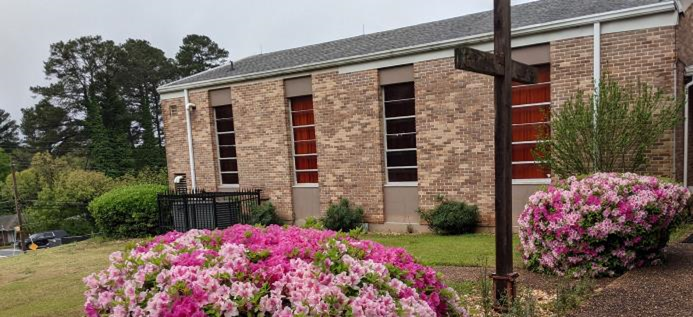Episodes

Tuesday Feb 04, 2020
02-02-20 Kevin Goins - The Discipline of Fasting, Part 2
Tuesday Feb 04, 2020
Tuesday Feb 04, 2020
“The Discipline of Fasting, Part 2” Matthew 6:16-18
This January we are focusing on how we can grow in our relationship with God by using the spiritual discipline of fasting. In Matthew 6 Jesus emphasizes the positives of fasting, but he first begins with three potential negatives.
I The first negative of fasting is the NO evangelicals have typically said to fasting (6:16a).
II The second negative of fasting is the No Jesus says to the abuse of fasting (6:16).
III The third negative of fasting is the No our physical bodies sometimes say to fasting.
IV There are two clues in Matthew 6 that fasting is not a ____________, but something decidedly _____________.
A. First, Jesus says when you fast don’t look ___________ (6:16a).
B. Second, Jesus says the focus of our fasting is not ____________ (6:18).
V The rewards of fasting:
A. First, fasting allows us to reach up to God as _________ persons.
1. Fasting puts the body front and center in our relationship with God so that we are not just a _______ or ___________ worshiping God.
2. Not only this, but when worship ignores the body, it not only deprives the body, it _________ the ________ of our spirit.
B. Second, fasting gives us a concrete way to express _________________.
1. Repentance is a change of __________ which produces a change in the way we _________.
2. The practice of repentance went all the way back to God’s command to the people of Israel when they __________ became a __________.
3. The biblical pattern is that repentance and fasting go ________ in _________.
C. Third, fasting provides a way to share in the ____________ of Christ.
1. We cannot share in the __________________ of Christ unless we are first willing to share in his sufferings.
2. The great thing about fasting is that it gives us a simple way to _________ ourselves.

Tuesday Jan 28, 2020
01-26-20 Kevin Goins - The Discipline of Fasting
Tuesday Jan 28, 2020
Tuesday Jan 28, 2020
“The Discipline of Fasting” Matthew 6:16-18
This January we are focusing on how we can grow in our relationship with God by using the spiritual discipline of fasting. Fasting has many advantages, but one advantage which is often overlooked is that this discipline can open our eyes to who we really are better than just about anything else we can do. In our text today Jesus emphasizes the positives of fasting, but he first begins with three potential negatives.
I The first negative of fasting is the NO A__________ e_____________ have said to fasting (6:16a).
A. One reason evangelicals have said no to fasting is because our culture has led us to the unbiblical view that the __________ is the enemy of the ___________.
B. But there are other reasons why we American evangelicals have a bias against fasting:
1. First, we associate fasting with what __________ _____________ do.
2. Second, we see it as a __________.
3. Third, fasting contradicts our _______________ mind-set.
II The second negative of fasting is the No __________ says to the ___________ of fasting (6:16).
A. The Pharisees took fasting, which was given by God, and used it as a way to _______________ themselves.
B. Jesus says people who fast to get noticed will be noticed, but that is all the _______________ they will get.
C. And we not only see this abuse of fasting in the Pharisees, we also see it throughout ___________ ___________.
III The third negative of fasting is the No our ___________ __________ sometimes say to fasting.
A. There are times when fasting is not advised, such as fasting during an _______________.
B. Some ____________ conditions make fasting dangerous.

Tuesday Jan 21, 2020
01-19-20 Kevin Goins - What we must do to hear from God
Tuesday Jan 21, 2020
Tuesday Jan 21, 2020
“What We Must Do to Hear From God” Luke 2:36-38
Many people, both Christian and non-Christian, would like to hear from God, but how do we make that happen? In the Christmas story we find someone who can teach us what we must do to hear God speak to us. Her name is Anna. What does she teach us about listening to God?
I First, we cannot be satisfied with a s___________________ life .
A. Anna’s _______ was to hear from God.
B. Hearing from God ran in her _____________.
C. Her desire to hear from God made her s________ o_______.
D. Anna’s biggest __________ was to hear from God.
E. Jesus made it clear that the superficial life h_________ our relationship with God.
II Second, we must be __________ we can hear from God (2:37b).
A. While Anna waited to hear from God about the birth of the Messiah, she was a_________ on what she had already heard
B. The only place we can really hear from God is a place of ___________________.
III Third, we must ask like we really _____________ it (2:37c).
A. Just as Anna fasted for Jesus to come the ________ time, so we must fast for him to come the _____________ time.
B. Fasting, as Richard Foster points out, is all about _________ from God.
IV Finally, if we want to hear from God, we must know what to do with the ________________ (2:38). -- Three things we must do if we want answers:
A. We must ______________ an answer.
B. We must _________ _______________ for the answer.
C. We must ____________ about the one who is the answer.

Tuesday Jan 14, 2020
01-12-20 Kevin Goins - Paul's Helping Resolutions
Tuesday Jan 14, 2020
Tuesday Jan 14, 2020
“Paul’s Helping Resolutions” Philippians 3:12-14
Many Christians do not believe in making resolutions, but the Apostle Paul made the kind of resolution in Philippians 3:10-11 which takes our breath away! Fortunately for us, Paul provides us with some helping resolutions which are not as daunting as the first, but which can help us as we seek to know and follow Jesus better in 2020.
I When we make resolutions we usually think of what would be i________.
A. Paul makes the ______ ideal resolution any Christian could ever make in 3:10-11.
B. Fortunately, Paul also gives us ________ ___________ resolutions.
II First, we should resolve never to be s____-s___________ followers of Jesus (3:12).
A. With everything that Paul has seen and heard and done, he says, “I am not yet m_____________.”
B. We must resolve never to be satisfied with what we have r____________.
III Second, we should resolve to stop looking _________ (3:13).
A. To forget here cannot mean to stop _____________.
B. To forget the past means to stop allowing it to have any __________ over us.
IV Third, we should resolve to be s_________-m_____________ (3:13b).
A. Only when we _______ at the target of God’s Kingdom can we _______ all the other worthy targets in our life.
B. If we make our one goal to please Jesus, it will benefit _________________, especially those who do _____ know Jesus.
V Lastly, we should resolve to be people who never __________ (3:14).

Sunday Jan 05, 2020
01-05-20 Jennifer Bliss Criswell - Making the Magi's Story Our Story
Sunday Jan 05, 2020
Sunday Jan 05, 2020

Thursday Jan 02, 2020
12-29-19 Kevin Goins - Celebrating Advent in the Right Direction
Thursday Jan 02, 2020
Thursday Jan 02, 2020
“Celebrating Advent in the Right Direction” Luke 2:36-38
For many people Christmas overflows with memories of the past. In fact, the story of the birth of Jesus is an event confined to the past. But the celebration of Advent isn’t limited to the past. It actually looks in two directions at the same time. A woman named Anna shows us why this dual perspective is so beneficial.
I First, when our celebration of Advent focuses on both the first and second comings of Jesus, it sets us free from the _________ myth.
A. There is a problem with Santa: Santa discriminates against __________.
B. Santa may be for children, but the Second Advent of Jesus will impact e________ p__________ who has ever lived on planet earth.
II Second, when our celebration of Advent focuses on both the first and second comings of Jesus, it sets us free from the ‘w__________ is only for ____________” myth (2:37b).
A. Anna made sure she was in the right _________ to be ready for the Messiah, and because she was, she ________ him.
B. If there is a Second Advent that could happen at any moment, then making worship the h__________ of our life makes s_______.
III Third, when our celebration of Advent focuses on both the first and second comings of Jesus, it sets us free from the “Christianity is for s______________” myth (2:37c).
A. Anna didn’t just attend church; she did something: she _______ and _______.
B. Just as Anna had something for which to pray and fast, so do we: we want to see the work Jesus began ________________.
IV Fourth, when our celebration of Advent focuses on both the first and second comings of Jesus, it sets us free from the myth that says the best Christmases are p________ (2:38).
A. If we must look backward to get excited about Christmas, something is _____________.
B. Anna was looking e______________ for the coming of the Messiah and so she was looking ___________, not __________.
V Finally, when our celebration of Advent focuses on both the first and second comings of Jesus, it sets us free from the “Christmas comes but o_______ a y________” myth (2:38b).

Monday Dec 23, 2019
12-22-19 Kevin Goins - Making Simeon's Story Our Story
Monday Dec 23, 2019
Monday Dec 23, 2019
“Making Simeon’s Story Our Story” Luke 2:25-35
One of the people who saw the baby Jesus, but whose participation in the Christmas story is often overlooked, is Simeon. Simeon can teach us a lot about how to make the Christmas story our story, but be warned: much of what he teaches us is shocking. For example:
I First, Simeon teaches us that to make the Christmas story our story we need the ___________ __________ (2:25-27a).
A. First, without the Holy Spirit no one has the s__________ v__________ necessary to see Jesus.
B. Second, Luke tells us it was the Holy Spirit that enabled ___________ to make the Christmas story his story.
C. Third, not only does the Bible and the life of Simeon tell us we need the Holy Spirit to make the Christmas story our story, so also does Charles Dicken’s A C____________ C_____________.
II Second, Simeon teaches us that to make the Christmas story our story, we must be prepared for ____________ (2:27-29).
A. When Simeon saw the baby Mary and Joseph brought to the
temple, he knew two things: God ________ his promise and he could now _______ in peace.
B. When the Christmas story becomes our story it transforms, not just our present, but the _______ moment of our life.
III Third, Simeon teaches us that to make the Christmas story our story, we must be concerned about more than just _________ ____________.
A. When Simeon sees Jesus, his vision is _____________.
B. We can’t make the Christmas story our story until we realize that we have a ______________ mission to tell all about the Christ of Christmas.
IV Fourth, Simeon teaches us that to make the Christmas story our story, we must be willing to be the cause of ______________ (2:33-35).
A. Simeon paid attention to the Old Testament prophets – he knew not everyone would accept the _______________.
B. In Romans 9 Paul says many in Israel stumbled over Jesus because they believed they could achieve their own personal righteousness by keeping the________.

Tuesday Dec 17, 2019
12-15-19 Kevin Goins - Making the Christmas Story My Story with testimonies
Tuesday Dec 17, 2019
Tuesday Dec 17, 2019

Wednesday Dec 11, 2019
12-08-19 Kevin Goins - Making Mary's Story My Story
Wednesday Dec 11, 2019
Wednesday Dec 11, 2019
“Making Mary’s Story Our Story” Luke 1:26-2:7
Of all the characters who played a part in the birth of the Savior, there is none who seems as unapproachable as Mary. Women have a hard time relating to a woman who gave birth knowing there was no human father she could blame for her pain. Men feel some sympathy for Joseph but we have no idea how to comprehend Mary. And then we Protestants feel estranged from Mary because the Roman Catholic Church has almost deified her. But all this misses the point. Next to Jesus there is no one so pivotal to the Christmas story as Mary, and if we want to know how to make the Christmas story our story, we dare not overlook her.
I First, Mary teaches us that no matter how ___________ it may be, it is ____________ to live out the Christmas story in our daily lives (1:26-37).
A. Why did the Savior have to be ______ as well as _________? Because no human being has a __________ for the problem of sin.
B. Why was it necessary for the Savior to be a _________ _________ at all? Because justice can only be done when wrongdoing is ____________ and God could not take our punishment.
II Second, Mary teaches us that just because it is _____________ to live out the Christmas story does not mean it will be ____________ (1:38).
A. When Mary and Joseph answered God’s call, people didn’t a_________ them – they ____________ at them.
B. God doesn’t call us to live a b________ or m__________ life. He calls us to an e___________ life on the cutting edge of his Kingdom.
III Third, Mary teaches us that living out the Christmas story will have an impact ______ _______________ ourselves (1:46-55).
IV Fourth, Mary teaches us that living out the Christmas story is not something we are expected to do ____________ (2:1-5).
A. Mary was impregnated by the Holy Spirit so her child would be the God-man. Why, then is __________ necessary?
B. God wanted his plan to save the world to be carried out, not by a single i_________________, but by a f___________.
V Fifth, Mary teaches us that living out the Christmas story is not going to __________________ the world (2:6-7).

Tuesday Dec 03, 2019
12-01-19 - Kevin Goins - Making the Shepherd's Story Our Story
Tuesday Dec 03, 2019
Tuesday Dec 03, 2019
“Making the Shepherd’s Story Our Story” Luke 2:8-18
Sometimes when we recall the Christmas story we feel detached, as if we are on the outside looking in. This year we want the story of the birth of the Savior to be our story. We intend to do this by entering the story of those who were literally part of that first Christmas. Today we want to make the shepherd’s story our story. How do we do that?
I First, for the shepherd’s story to be our story, we need to see how much the shepherd’s story __________ our story (2:8).
A. From the beginning of the Bible the calling to be a shepherd was highly r______________ and shepherds were looked on in a p__________ way.
B. But by Jesus’ day things had changed – shepherds were looked on with s_____________ and d____________.
II Second, for the shepherd’s story to be our story, we need to know that we can never be ________ ______________ to please God (2:9-11, 13).
A. The irreligious shepherds got a special announcement about the birth of the Savior, but the good religious folks got ___________.
B. The most radical fact about the Christmas story is this: If you are not a _____________, Christmas has nothing to offer you.
III Third, for the shepherd’s story to be our story, we must be willing to ______ where the truth can be ____________ (2:12-15).
A. Because there are genuine Christians sprinkled throughout the U.S., most people know something about Jesus being the _____________.
B. If you want to know about the Savior, who he is and how he can change your life, you must look for him in the _____________ ___________ of _________.
IV Finally, for the shepherd’s story to be our story, we must not only ___________ what they believed, we must _________ as they lived.
A. After the shepherds found the Savior they were still shepherds, but they were not __________ shepherds.
B. Now, they are also doing the work of _____________.

